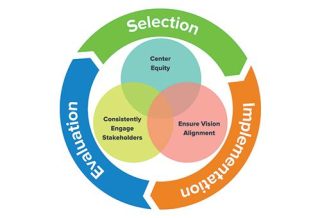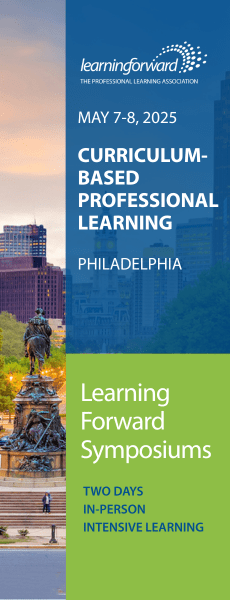TOOLS
Implementing instructional materials
A conversation
By Learning Forward
Categories: Instructional materials/curriculumDecember 2018
Vol. 39 No. 6
While the articles in this issue of The Learning Professional can offer readers a solid foundation in understanding the intersection of instructional materials and professional learning more deeply, considering how to adapt or apply this new understanding will involve team study, reflection, and collaboration.
Purpose
The following pages include a set of protocols for teams to use to explore views on instructional materials and professional learning and assess the current state of the local context related to instructional materials.
Options for use
Begin with Examining Assumptions on p. 63. This protocol asks educators to indicate the level of their agreement with a variety of statements related to instructional materials.
First ask individuals to fill out the protocol and then facilitate a conversation through each assumption. The goal is not to reach consensus at this point but rather to surface assumptions and raise related questions and perceptions among a team working on this topic.
During conversation for each assumption, in addition to hearing team members’ views, probe for deeper exploration, perhaps asking what changes to the statement would make it one they agree with or disagree with, or what else they would need to know about the topic.
Next, or as a second conversation, use A Learning System Assessment on p. 64 to look inward at the team’s local context for learning. Either ask individuals to circle answers for each statement or have pairs complete the assessment together. Discuss the assessment as a full group, and together take notes on the columns listed on p. 65 with the headings Strengths, Concerns, and Wonderings.
Finally, use Considering the 4 A’s on p. 66 to conclude the conversation for this stage of the work. Either fill in the chart as a group, as smaller groups, or create each square as a separate poster, asking small groups to start at one poster filling in their responses, and then rotating through each poster in a carousel brainstorm. If the timing is right, facilitators may adapt one of the A’s to another important A: actions.
Learning Forward is the only professional association devoted exclusively to those who work in educator professional development. We help our members plan, implement, and measure high-quality professional learning so they can achieve success with their systems, schools, and students.
Categories: Instructional materials/curriculum
Recent Issues
LEARNING DESIGNS
February 2025
How we learn influences what we learn. This issue shares essential...
BUILDING BRIDGES
December 2024
Students benefit when educators bridge the continuum of professional...
CURRICULUM-BASED PROFESSIONAL LEARNING
October 2024
High-quality curriculum requires skilled educators to put it into...
LEARNING TO PIVOT
August 2024
Sometimes new information and situations call for major change. This issue...













